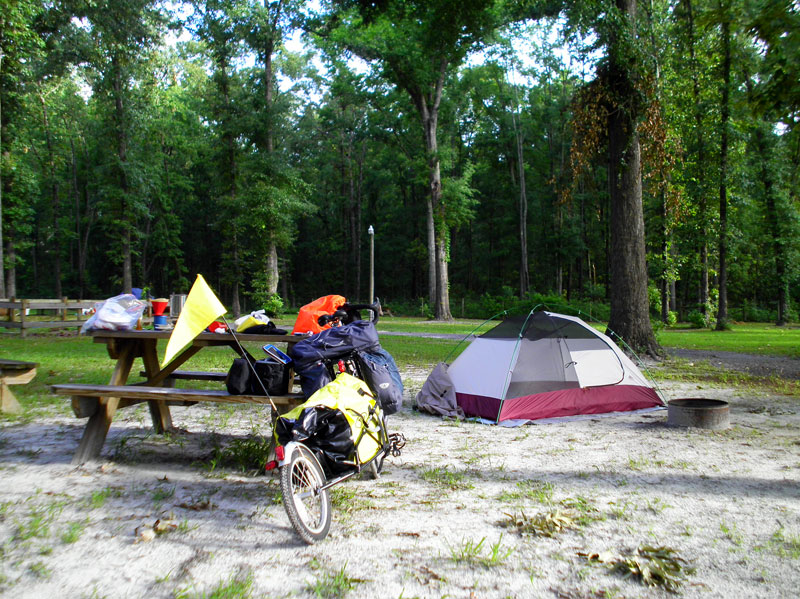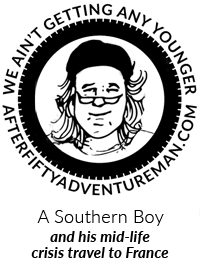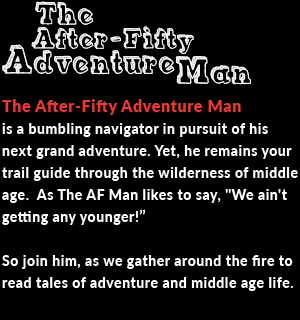May 27, 2010 –
Suwannee River State Park, Florida
First off, my butt hurts. (Everyone eventually gets around to asking, so I figured I’d just get right to it. After 200 miles on my gel seat, I understand why cyclists consider Chamois Butt’r an object of love; you simply have to have it.) And my legs are sore in places that have never hurt before. But what I’m learning—after cycling two consecutive 50-mile days—is this: at least 60% of the trip is between the ears. It’s a mind game.
Even as I pedal across Florida, I keep imagining myself seated at my computer, working, taking calls, doing all the things I would normally be doing if it weren’t for the fact that I am cycling away through the North Florida countryside. I spend a good part of each day trying to let go of all that has marked my days, all that has formulated my reality for such a long period of my life. I am, in a way, an oddity to myself. I don’t understand how I am supposed to function, now. Yet, instinctively, my legs seem to know—so they keep on pedaling, and I simply follow, letting them take me where I need to go.
Get out of your head, Hugh, I tell myself. This is new. This is good. Relax. Breathe. Take in everything around you. Enjoy it. And I try. But there are hills to climb. And then more hills. The hills begin to pose a dilemma you finally have to address. I tell myself that if I make it to the next crest, I will stop and take a rest. I don’t stop, though, because I am either too out of breath to hit the brakes or too elated that I actually made it to the top. The downhill glide comes next, and if the hill was a big one, I exhilarate in the twenty-mph coast down the other side, before I have to attack the next rise. I try to see these peaks and valleys with a Zen-like eye. Clearly, they represent my own ups and downs, my inner turmoil, my on-going self-negotiation. On each uphill slope, I ask myself, Why do you need to do this? As I glide effortlessly down the other side, I pretend to understand.
Maintaining my sanity and learning to keep my inner equilibrium are as important as the physical effort I expend to turn the crank and pedal myself down the road. Although the sheer accumulation of miles has begun to assuage my doubts about my ability to make such a journey, it is still not possible for me to just hop on the Surly and say, “OK! Let me pedal the next fifty miles to get from point A to point B.” No. I have had to develop a methodology to carry myself through the day. Without it, I believe I would simply disintegrate into a weeping mass of blubber on the side of the road.
Preparation has become my constant mantra.
Today, like every day, before starting out, I check Google Maps for the road ahead. I consider where I will stay this evening: Is there a campground? A fire station? An RV park? A Warm Showers host that can take me in? I pack my panniers and store my gear in an orderly way. I fold my tent carefully in accordance with its instructions, before placing it in my waterproof bag on board the B.O.B. trailer. And as I dress, I realize that the spandex clothing has come to seem less silly and more a necessity for a successful ride. I understand, now, that every time I throw my leg across the Surly, I am committing to building the next part of the bridge that I hope will carry me all the way to Taos—and that each small act of preparation supports that intention and helps carry me another fifty miles closer to my goal.
I secure my yellow and black aerodynamic crash helmet with care and make a quick prayer that it will serve me well if needed. As I slip my riding shades in place, I sense an audible click: my gear is connected, my space suit complete, and I am ready to ride. As I push off and begin to pedal, in my mind, I hear David Bowie singing, “Ground control to Major Tom.” In a strange way, I too feel like an astronaut of sorts, because my progress is now measured by a new sense of time, one that is so completely foreign to me that I have to wonder if this is how space travelers feel crossing deep expanses of space, tethered by the fragile umbilical of their craft. I feel that same fragile tether, delicately balanced on the edge of a ribbon of black asphalt, recognizing how easily it could be broken by some multi-tasker on a cell phone or a mindless drunk asleep at the wheel.
As is the case each morning, these sobering thoughts bring me to assess my commitment to this journey and to the faithful idea that all will be well on the road. And, as I do today, I answer these considerations every time I mount up for the ride. Each day is a new commitment and a new journey.
Last night, as I lay in my tent at Suwannee River State Park, the pine trees swayed above me, and a barred owl hooted reassuringly, in his deep-throated way. The moon was out and cast its subtle light around my little world. Cocooned inside my tent, I felt comforted by the forces of nature. And for the first time in a very long while, I felt as if I belonged here, belonged to the earth—was not separate from it. It seemed as if nature was reaching out to me, communicating security on a level I have not experienced since I was a child. I realized that in all the years I’ve spent working in my design studio, focused so intently on the computer screen before me, I have put a distance between myself and the natural world.
The great benefit of the bike is that it forces you to slow down and become a participant in the world around you. I think the earth must miss our presence, for it is constantly calling out to us, even as we speed by, encapsulated in our steel and glass automobiles—the tin can David Bowie sings about in his saga of Major Tom. So, as I head west this morning, towards Monticello, Florida, I make a silent pact with myself to experience each of my 46 miles. I promise myself I will inhale every molecule of air I encounter, absorb every vista I pass, and assess everything for the information it has to offer. I imagine this is how frontiersmen existed, as they made their way across new and hostile territory—living instinctually, pitting their very survival on the messages they received through their five senses.
Helmet snapped securely in place, space suit charged and ready for the day ahead, I strain to pedal up the first hill, and all too soon find myself asking, Why am I doing this? But as I crest the hill and begin my effortless descent, I suddenly understand. I am here, balancing my own weight and that of all my gear atop these two wheels, rather than sitting at a computer taking calls, because, whatever the cost this trip exacts on my person, I must break free from my tin can, and, in a way known only to me, rise far above the world.
Can you hear me, Major Tom?












Leave a reply